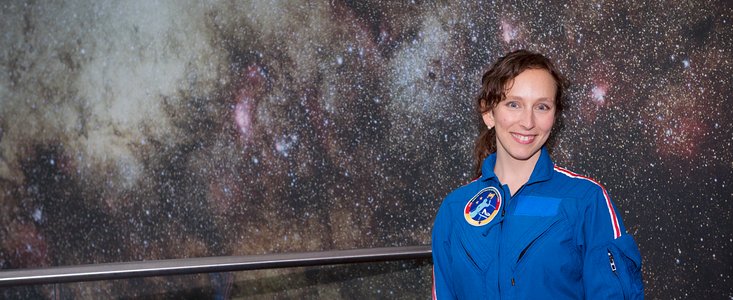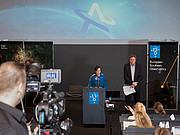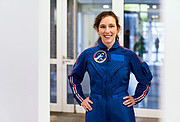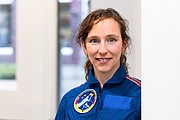Press Release
ESO Astronomer Selected for Astronaut Training Programme
16 February 2018
ESO astronomer Suzanna Randall is one step closer to her dream of becoming the first German woman to travel into space. She has been selected as a new trainee of the initiative Astronautin, which aims to train the first female German astronaut and send her on a research mission to the International Space Station. The announcement was made today at a press conference at ESO Headquarters in Garching, Germany.
The Astronautin initiative was set up in 2016 to inspire young women to take up professions in space, science, mathematics and technology, and to send the first female German astronaut into space. It will also use the microgravity environment of the International Space Station (ISS) to study how the female body reacts to weightlessness [1].
Thanks to her scientific background and sporting talents, Suzanna Randall has been selected as one of two Astronautin trainees. Born in Cologne, the 38-year-old studied astronomy in the UK before graduating from the University of Montreal in Canada with a PhD in astrophysics. Randall currently works as an astronomer at ESO.
Randall began her ESO career as an ESO Fellow and is now involved with the ALMA project, a global partnership that operates the world's largest radio telescope in the Chilean Atacama desert. ALMA consists of 66 giant antennas observing millimetre and submillimetre wavelengths and is the most powerful astronomical observatory for studying the cool and the distant Universe [2]. Randall also studies the evolution of pulsating, blue, subdwarf stars. She has been an avid paraglider for many years, is a trained yoga instructor and enjoys winter sports.
Astronaut candidates in the Astronautin training programme become familiar with the environment of the ISS, and learn about on-board systems and procedures. The programme also involves participating in many activities that place heavy demands on candidates, including parabolic flights, survival training, flight training and robotics training.
Randall explains what motivated her to apply for Astronautin: "I want to show that it is possible for ordinary women to develop the necessary knowledge and skills to become an astronaut. And I think it's important that women are represented at all levels of society. It should go without saying that women work in space.”
Over the next two years, Randall will compete for the single space mission place against 34-year-old meteorologist Insa Thiele-Eich. In April 2017, Thiele-Eich was selected for the programme alongside Eurofighter pilot Nicola Baumann, out of 400 candidates. But after Baumann left the project, the selection committee unanimously agreed to give Suzanna Randall her place.
"We are pleased that Suzanna Randall can jump directly into training with her previous knowledge as an astrophysicist,” says Claudia Kessler, initiator of Astronautin.
Randall and Thiele-Eich are supported in their training by the aerospace company Airbus. The innovation company, HYVE, works with Astronautin on a challenging crowdsourcing campaign. Together they develop ideas and solutions to finance the space mission of the first female German astronaut. The press conference event has been supported by IWG Isolier Wendt GmbH from Berlin.
Notes
[1] The International Space Station (ISS) is a habitable artificial satellite that has been made possible through a partnership between Europe, the United States, Russia, Japan and Canada. The 360-tonne ISS has more than 820 cubic metres of pressurised space — enough room for its crew of six astronauts and a vast array of scientific experiments. Station construction began in November 1998.
[2] With a resolution ten times better than the NASA/ESA Hubble Space Telescope, ALMA addresses some of the deepest questions of our cosmic origins. The huge array of giant antennas is used to study the building blocks of stars, planetary systems, galaxies, and life itself. The ALMA observatory uses state-of-the-art technology to achieve its scientific goals while operating in the challenging conditions of the high Andes.
More information
ESO is the foremost intergovernmental astronomy organisation in Europe and the world’s most productive ground-based astronomical observatory by far. It is supported by 16 countries: Austria, Belgium, Brazil, Czechia, Denmark, France, Finland, Germany, Italy, the Netherlands, Poland, Portugal, Spain, Sweden, Switzerland and the United Kingdom, along with the host state of Chile and by Australia as a strategic partner. ESO carries out an ambitious programme focused on the design, construction and operation of powerful ground-based observing facilities enabling astronomers to make important scientific discoveries. ESO also plays a leading role in promoting and organising cooperation in astronomical research. ESO operates three unique world-class observing sites in Chile: La Silla, Paranal and Chajnantor. At Paranal, ESO operates the Very Large Telescope and its world-leading Very Large Telescope Interferometer as well as two survey telescopes, VISTA working in the infrared and the visible-light VLT Survey Telescope. ESO is also a major partner in two facilities on Chajnantor, APEX and ALMA, the largest astronomical project in existence. And on Cerro Armazones, close to Paranal, ESO is building the 39-metre Extremely Large Telescope, the ELT, which will become “the world’s biggest eye on the sky”.
Links
Contacts
Claudia Kessler
Stiftung erste deutsche Astronautin gGmbH
Email: claudia.kessler@dieastronautin.de
Richard Hook
ESO Public Information Officer
Garching bei München, Germany
Tel: +49 89 3200 6655
Cell: +49 151 1537 3591
Email: rhook@eso.org
Our use of Cookies
We use cookies that are essential for accessing our websites and using our services. We also use cookies to analyse, measure and improve our websites’ performance, to enable content sharing via social media and to display media content hosted on third-party platforms.
ESO Cookies Policy
The European Organisation for Astronomical Research in the Southern Hemisphere (ESO) is the pre-eminent intergovernmental science and technology organisation in astronomy. It carries out an ambitious programme focused on the design, construction and operation of powerful ground-based observing facilities for astronomy.
This Cookies Policy is intended to provide clarity by outlining the cookies used on the ESO public websites, their functions, the options you have for controlling them, and the ways you can contact us for additional details.
What are cookies?
Cookies are small pieces of data stored on your device by websites you visit. They serve various purposes, such as remembering login credentials and preferences and enhance your browsing experience.
Categories of cookies we use
Essential cookies (always active): These cookies are strictly necessary for the proper functioning of our website. Without these cookies, the website cannot operate correctly, and certain services, such as logging in or accessing secure areas, may not be available; because they are essential for the website’s operation, they cannot be disabled.
Functional Cookies: These cookies enhance your browsing experience by enabling additional features and personalization, such as remembering your preferences and settings. While not strictly necessary for the website to function, they improve usability and convenience; these cookies are only placed if you provide your consent.
Analytics cookies: These cookies collect information about how visitors interact with our website, such as which pages are visited most often and how users navigate the site. This data helps us improve website performance, optimize content, and enhance the user experience; these cookies are only placed if you provide your consent. We use the following analytics cookies.
Matomo Cookies:
This website uses Matomo (formerly Piwik), an open source software which enables the statistical analysis of website visits. Matomo uses cookies (text files) which are saved on your computer and which allow us to analyze how you use our website. The website user information generated by the cookies will only be saved on the servers of our IT Department. We use this information to analyze www.eso.org visits and to prepare reports on website activities. These data will not be disclosed to third parties.
On behalf of ESO, Matomo will use this information for the purpose of evaluating your use of the website, compiling reports on website activity and providing other services relating to website activity and internet usage.
Matomo cookies settings:
Additional Third-party cookies on ESO websites: some of our pages display content from external providers, e.g. YouTube.
Such third-party services are outside of ESO control and may, at any time, change their terms of service, use of cookies, etc.
YouTube: Some videos on the ESO website are embedded from ESO’s official YouTube channel. We have enabled YouTube’s privacy-enhanced mode, meaning that no cookies are set unless the user actively clicks on the video to play it. Additionally, in this mode, YouTube does not store any personally identifiable cookie data for embedded video playbacks. For more details, please refer to YouTube’s embedding videos information page.
Cookies can also be classified based on the following elements.
Regarding the domain, there are:
- First-party cookies, set by the website you are currently visiting. They are stored by the same domain that you are browsing and are used to enhance your experience on that site;
- Third-party cookies, set by a domain other than the one you are currently visiting.
As for their duration, cookies can be:
- Browser-session cookies, which are deleted when the user closes the browser;
- Stored cookies, which stay on the user's device for a predetermined period of time.
How to manage cookies
Cookie settings: You can modify your cookie choices for the ESO webpages at any time by clicking on the link Cookie settings at the bottom of any page.
In your browser: If you wish to delete cookies or instruct your browser to delete or block cookies by default, please visit the help pages of your browser:
Please be aware that if you delete or decline cookies, certain functionalities of our website may be not be available and your browsing experience may be affected.
You can set most browsers to prevent any cookies being placed on your device, but you may then have to manually adjust some preferences every time you visit a site/page. And some services and functionalities may not work properly at all (e.g. profile logging-in, shop check out).
Updates to the ESO Cookies Policy
The ESO Cookies Policy may be subject to future updates, which will be made available on this page.
Additional information
For any queries related to cookies, please contact: pdprATesoDOTorg.
As ESO public webpages are managed by our Department of Communication, your questions will be dealt with the support of the said Department.






